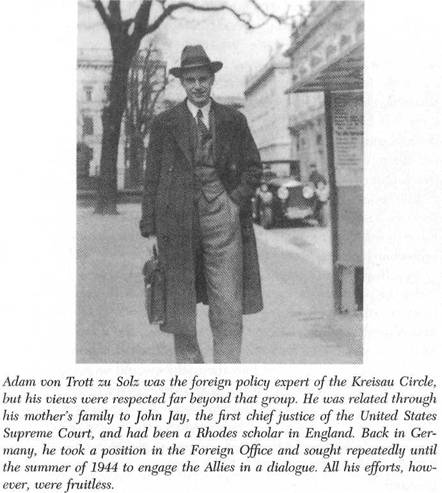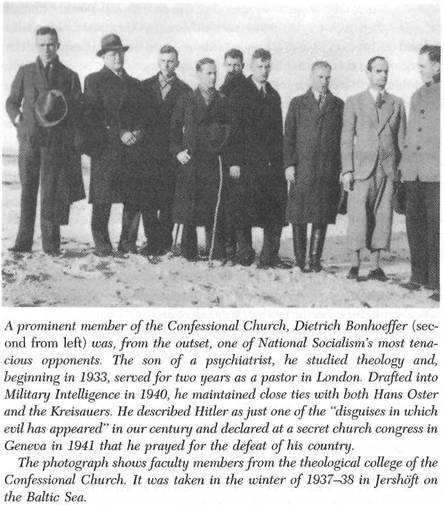agents to Dohnanyi’s office, which was located immediately adjacent lo Hans Oster’s.
Canaris had been warned more than once, most recently that very morning, that trouble was brewing. And in almost every case the fingers pointed at Brigadier General Oster. His anxiety growing, Canaris had ordered that his closest associate immediately dispose of any incriminating documents. Whether Oster failed to realize the urgency of the warning or was simply too busy meeting endlessly with Olbricht, Beck, Gisevius, Schlabrendorff, and Heinz is not known; in any event he did not carry out his orders. In the course of their search Roeder and Sonderegger caught Dohnanyi trying to remove some papers from files that were being seized. When he was prevented from doing so, Dohnanyi was heard whispering “The notes!” to Oster, who also attempted to remove them. As the indictment later stated, Oster was “immediately asked to explain himself and required to produce the notes.” Roeder ordered Oster out of the room and reported to his superiors what had happened. As a result, Oster was placed under house arrest, and a few days later he was dismissed from his position at Military Intelligence. Shortly thereafter Canaris called a meeting of department heads and “officially informed them of or ders to avoid any contact with Oster.”3
This was a terrible blow to the resistance-the worst it had suffered so far. In Schlabrendorff s words, it “lost its managing director.” Gisevius spoke of a “psychological shock” that stunned everyone and left a “conspiratorial vacuum.” Oster explained his admittedly foolish act by saying that he had assumed at first that Dohnanyi meant certain notes coded “U7,” referring to a Military Intelligence operation to spirit Jews out of Nazi- occupied Europe by disguising them as agents. At least as disorienting as Oster’s removal was the fact that, for the first time, the previously inviolable inner sanctums of Military Intelligence had been invaded. To add to the grim news, Dietrich Bonhoeffer was arrested the same day, as were Dohnanyi’s wife, Christine, in Sakrow, near Berlin, Josef Muller in Munich, and another Military Intelligence employee in Prague.
The papers for whose sake Dohnanyi and Oster had risked so much were actually totally unrelated to the U7 operation. They were hardly less compromising, however, and they prompted Roeder to announce triumphantly after reading them, “I’m going to clean up that shop!”4 Most important, one of the seized “notes” contained references to an issue that was becoming of great concern to almost all opponents of the regime, arising repeatedly in the course of their discussions-namely, the relations between the German resistance and the Allies and the possibility of negotiating a last-minute peace agreement.
Since the spring of 1942 the opposition had debated whether the Allies would be willing to negotiate a peace treaty after a coup in Germany and whether that would even be desirable. Some members of the Kreisau Circle in particular opposed any attempts to negotiate such a treaty. With their decidedly religious cast, they felt that Hitler and his minions should be dispatched, metaphorically, to the inferno that had spawned them. But most of the opposition figures agreed, though they might differ on the details, that it was their duty to save as much of the “substance” of Germany as possible from political and moral corruption and now, in the midst of the unprecedented Allied bombing campaign, from outright physical destruction. This group therefore insisted that everything possible be done to contact the Allies. They feared that time was running out: Germany’s remaining bargaining power was quickly evaporating as its military strength declined and the ever more dominant Allies forged ahead.
This was the crux of the matter, the issue that many believed would make or break the resistance. If the leverage Germany still had, however weak it might be, could not be used to negotiate a peace treaty, then the resistance might as well avoid the extremely dangerous, if not suicidal, risk of a coup attempt and simply watch the regime go down in flames. The opposition’s foreign policy experts-primarily Ulrich von Hassell but also Adam von Trott and others-decided after much deliberation that in view of all the Nazis’ broken promises, violence, and crimes, there was no certainty that an “acceptable peace” could be negotiated, but that at the very least it remained a possibility.5

Such a hope was inconceivable unless the Allies were prepared to distinguish between Hitler and the German people. The conspirators based the plans for their own uprising entirely on the belief that this distinction existed and on the need to emphasize it for the benefit of everyone, so as to expose the falsity of the Nazi propaganda campaigns that depicted the Fuhrer and the
From a practical point of view, this meant they needed to be clear about the prospects facing a German government once the Nazis had been overthrown. Realizing that many concessions and guarantees would inevitably be extracted from Germany, the members of the resistance wanted to find out what the Allies’ maximum demands might be and to ensure that they themselves would be recognized, in theory at least, as equal partners in a European peace plan. What they did not want was to become the managers of a “liquidation commission” that simply carried out the dictates of the Allied powers. The opposition fully realized that such a situation would leave it standing “right in the middle of all the filth,” in the dramatic words of one member.6
The resistance continued to pin its hopes on London, despite the misunderstandings, exasperation, and devastating setbacks that had characterized its overtures in the late 1930s. In focusing on this relationship, the German resistance considerably overestimated Britain’s role and influence in the Allied coalition; for quite some time London had not had the power to sign agreements of its own with anyone. Most of the conspirators felt, however, that Britain was somehow closer to them-and not just geographically. In comparison with the other two great powers, the United States and the Soviet Union, Britain seemed to stand for a less foreign, more European world. Just as opposition emissaries had traveled to the British capital in the late thirties, they now sought to pave the way for talks with London through British posts in neutral countries.
Theo Kordt had already attempted to do so at the outset of the war, having been dispatched by the Foreign Office to Bern, Switzerland, for precisely that purpose. All his efforts came to naught, however, as did those of Josef Wirth, the former German chancellor, who had emigrated to Switzerland; Carl Jacob Burckhardt; Willem Adolf Visser’t Hooft, the secretary-general of the provisional World Council of Churches in Geneva; and many others. In May 1941 Goerdeler passed along to the British government a peace plan approved by Brauchitsch; the cabinet declined even to acknowledge it. The British middleman informed his German contact that he had been forbidden to accept any such documents in the future.

Another series of attempts to establish contact had been under way in Stockholm since the early 1940s and revolved largely around Theodor Steltzer, a key member of the Kreisau Circle. In May 1942 Bishop George Bell of Chichester met with Dietrich Bonhoeffer and his fellow clergyman Hans Schonfeld in Stockholm. Without knowing anything about the plans of the other, the two Germans had both decided to go to Sweden when they learned that Bell would be there. They told him about the opposition and the Kreisauers’ ideas for peace and expressed the hope that some token of encouragement might be offered. Bell was quite well acquainted with Bonhoeffer, who had been a pastor in the German church in London during the 1930s, and knew that he was one of the leading figures in the Confessional Church in Germany. A man of radical religious conviction, Bonhoeffer had repeatedly insisted that Hitler had to be “exterminated” regardless of the political consequences. At a secret church conference in Geneva in 1941 he had gone even further, announcing that he prayed for the defeat of his country because that was the only way Germany would be able to atone for the crimes it had committed.7 Schonfeld, on the other hand, brought only one question: Would the Allies adopt a different stance toward a Germany that had liberated itself from Hitler than they would toward a Germany still under his rule? Bell forwarded a report to the British Foreign Office, but Anthony Eden wrote back only to say he was “satisfied that it is not in the national interest to provide an answer of any kind.” When Bell approached the British Foreign Office again, Eden noted in the margin of his reply, “I see no reason whatsoever to encourage this pestilent priest!”8
One year later Helmuth von Moltke went to Stockholm for a week, taking with him some information about the White Rose and one of its leaflets, as if he felt impelled to prove the seriousness of his opposition to the Nazi regime. Eugen Gerstenmaier, the theologian, and Hans Lukaschek, a lawyer who had joined the Kreisau Circle,

